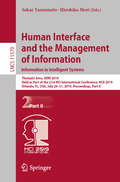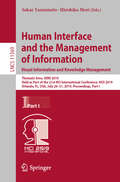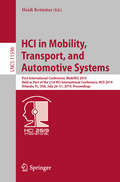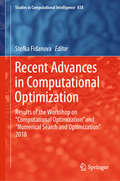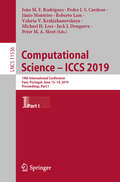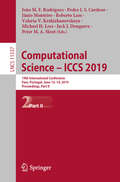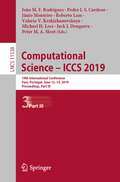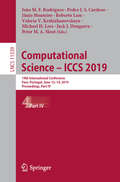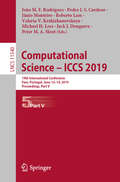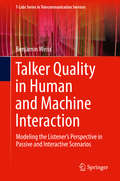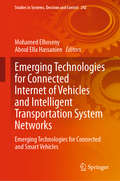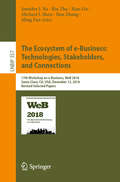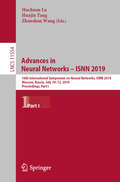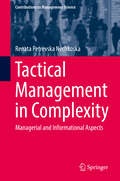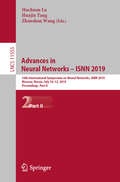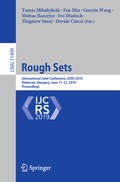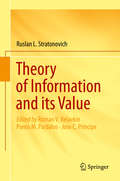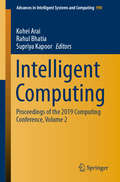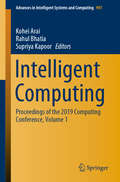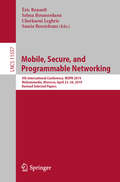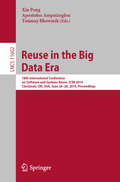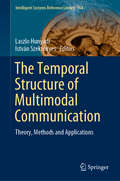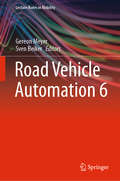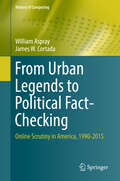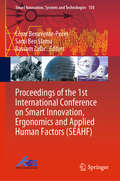- Table View
- List View
Human Interface and the Management of Information. Information in Intelligent Systems: Thematic Area, HIMI 2019, Held as Part of the 21st HCI International Conference, HCII 2019, Orlando, FL, USA, July 26-31, 2019, Proceedings, Part II (Lecture Notes in Computer Science #11570)
by Sakae Yamamoto Hirohiko MoriThis two-volume set LNCS 11569 and 11570 constitutes the refereed proceedings of the Thematic Area on Human Interface and the Management of Information, HIMI 2019, held as part of HCI International 2019 in Orlando, FL, USA.HCII 2019 received a total of 5029 submissions, of which 1275 papers and 209 posters were accepted for publication after a careful reviewing process. The 91 papers presented in the two volumes were organized in topical sections named: Visual information; Data visualization and analytics; Information, cognition and learning; Information, empathy and persuasion; Knowledge management and sharing; Haptic and tactile interaction; Information in virtual and augmented reality; Machine learning and intelligent systems; Human motion and expression recognition and tracking; Medicine, healthcare and quality of life applications.
Human Interface and the Management of Information. Visual Information and Knowledge Management: Thematic Area, HIMI 2019, Held as Part of the 21st HCI International Conference, HCII 2019, Orlando, FL, USA, July 26–31, 2019, Proceedings, Part I (Lecture Notes in Computer Science #11569)
by Sakae Yamamoto Hirohiko MoriThis two-volume set LNCS 11569 and 11570 constitutes the refereed proceedings of the Thematic Area on Human Interface and the Management of Information, HIMI 2019, held as part of HCI International 2019 in Orlando, FL, USA.HCII 2019 received a total of 5029 submissions, of which 1275 papers and 209 posters were accepted for publication after a careful reviewing process. The 91 papers presented in the two volumes were organized in topical sections named: Visual information; Data visualization and analytics; Information, cognition and learning; Information, empathy and persuasion; Knowledge management and sharing; Haptic and tactile interaction; Information in virtual and augmented reality; Machine learning and intelligent systems; Human motion and expression recognition and tracking; Medicine, healthcare and quality of life applications.
HCI in Mobility, Transport, and Automotive Systems: First International Conference, MobiTAS 2019, Held as Part of the 21st HCI International Conference, HCII 2019, Orlando, FL, USA, July 26-31, 2019, Proceedings (Lecture Notes in Computer Science #11596)
by Heidi KrömkerThis book constitutes the refereed proceedings of the First International Conference on HCI in Mobility, Transport, and Automotive Systems, MobiTAS 2019, held as part of the 21st International Conference on Human-Computer Interaction, HCII 2019, in Orlando, FL, USA in July, 2019. The 1274 full papers and 209 posters presented at the HCII 2019 conferences were carefully reviewed and selected from 5029 submissions. The papers cover the entire field of human-computer interaction, addressing major advances in knowledge and effective use of computers in a variety of application areas. The papers in this volume are organized in the following topical sections: interaction in autonomous and semiautonomous vehicles; driving experience; and mobility and transport.
Recent Advances in Computational Optimization: Results of the Workshop on “Computational Optimization” and “Numerical Search and Optimization” 2018 (Studies in Computational Intelligence #838)
by Stefka FidanovaThis book presents new optimization approaches and methods and their application in real-world and industrial problems. Numerous processes and problems in real life and industry can be represented as optimization problems, including modeling physical processes, wildfire, natural hazards and metal nanostructures, workforce planning, wireless network topology, parameter settings for controlling different processes, extracting elements from video clips, and management of cloud computing environments. This book shows how to develop algorithms for these problems, based on new intelligent methods like evolutionary computations, ant colony optimization and constraint programming, and demonstrates how real-world problems arising in engineering, economics and other domains can be formulated as optimization problems. The book is useful for researchers and practitioners alike.
Computational Science – ICCS 2019: 19th International Conference, Faro, Portugal, June 12–14, 2019, Proceedings, Part I (Lecture Notes in Computer Science #11536)
by João M. Rodrigues Pedro J. Cardoso Peter M.A. Sloot Jânio Monteiro Roberto Lam Valeria V. Krzhizhanovskaya Michael H. Lees Jack J. DongarraThe five-volume set LNCS 11536, 11537, 11538, 11539, and 11540 constitutes the proceedings of the 19th International Conference on Computational Science, ICCS 2019, held in Faro, Portugal, in June 2019.The total of 65 full papers and 168 workshop papers presented in this book set were carefully reviewed and selected from 573 submissions (228 submissions to the main track and 345 submissions to the workshops). The papers were organized in topical sections named: Part I: ICCS Main Track Part II: ICCS Main Track; Track of Advances in High-Performance Computational Earth Sciences: Applications and Frameworks; Track of Agent-Based Simulations, Adaptive Algorithms and Solvers; Track of Applications of Matrix Methods in Artificial Intelligence and Machine Learning; Track of Architecture, Languages, Compilation and Hardware Support for Emerging and Heterogeneous Systems Part III: Track of Biomedical and Bioinformatics Challenges for Computer Science; Track of Classifier Learning from Difficult Data; Track of Computational Finance and Business Intelligence; Track of Computational Optimization, Modelling and Simulation; Track of Computational Science in IoT and Smart Systems Part IV: Track of Data-Driven Computational Sciences; Track of Machine Learning and Data Assimilation for Dynamical Systems; Track of Marine Computing in the Interconnected World for the Benefit of the Society; Track of Multiscale Modelling and Simulation; Track of Simulations of Flow and Transport: Modeling, Algorithms and Computation Part V: Track of Smart Systems: Computer Vision, Sensor Networks and Machine Learning; Track of Solving Problems with Uncertainties; Track of Teaching Computational Science; Poster Track ICCS 2019 Chapter “Comparing Domain-decomposition Methods for the Parallelization of Distributed Land Surface Models” is available open access under a Creative Commons Attribution 4.0 International License via link.springer.com.
Computational Science – ICCS 2019: 19th International Conference, Faro, Portugal, June 12–14, 2019, Proceedings, Part II (Lecture Notes in Computer Science #11537)
by João M. Rodrigues Pedro J. Cardoso Peter M.A. Sloot Jânio Monteiro Roberto Lam Valeria V. Krzhizhanovskaya Michael H. Lees Jack J. DongarraThe five-volume set LNCS 11536, 11537, 11538, 11539 and 11540 constitutes the proceedings of the 19th International Conference on Computational Science, ICCS 2019, held in Faro, Portugal, in June 2019.The total of 65 full papers and 168 workshop papers presented in this book set were carefully reviewed and selected from 573 submissions (228 submissions to the main track and 345 submissions to the workshops). The papers were organized in topical sections named:Part I: ICCS Main Track Part II: ICCS Main Track; Track of Advances in High-Performance Computational Earth Sciences: Applications and Frameworks; Track of Agent-Based Simulations, Adaptive Algorithms and Solvers; Track of Applications of Matrix Methods in Artificial Intelligence and Machine Learning; Track of Architecture, Languages, Compilation and Hardware Support for Emerging and Heterogeneous Systems Part III: Track of Biomedical and Bioinformatics Challenges for Computer Science; Track of Classifier Learning from Difficult Data; Track of Computational Finance and Business Intelligence; Track of Computational Optimization, Modelling and Simulation; Track of Computational Science in IoT and Smart Systems Part IV: Track of Data-Driven Computational Sciences; Track of Machine Learning and Data Assimilation for Dynamical Systems; Track of Marine Computing in the Interconnected World for the Benefit of the Society; Track of Multiscale Modelling and Simulation; Track of Simulations of Flow and Transport: Modeling, Algorithms and Computation Part V: Track of Smart Systems: Computer Vision, Sensor Networks and Machine Learning; Track of Solving Problems with Uncertainties; Track of Teaching Computational Science; Poster Track ICCS 2019 Chapter “Comparing Domain-decomposition Methods for the Parallelization of Distributed Land Surface Models” is available open access under a Creative Commons Attribution 4.0 International License via link.springer.com.
Computational Science – ICCS 2019: 19th International Conference, Faro, Portugal, June 12–14, 2019, Proceedings, Part III (Lecture Notes in Computer Science #11538)
by Jânio Monteiro João M. Rodrigues Valeria V. Krzhizhanovskaya Roberto Lam Michael H. Lees Jack J. Dongarra Pedro J. Cardoso Peter M.A. SlootThe five-volume set LNCS 11536, 11537, 11538, 11539 and 11540 constitutes the proceedings of the 19th International Conference on Computational Science, ICCS 2019, held in Faro, Portugal, in June 2019.The total of 65 full papers and 168 workshop papers presented in this book set were carefully reviewed and selected from 573 submissions (228 submissions to the main track and 345 submissions to the workshops). The papers were organized in topical sections named: Part I: ICCS Main Track Part II: ICCS Main Track; Track of Advances in High-Performance Computational Earth Sciences: Applications and Frameworks; Track of Agent-Based Simulations, Adaptive Algorithms and Solvers; Track of Applications of Matrix Methods in Artificial Intelligence and Machine Learning; Track of Architecture, Languages, Compilation and Hardware Support for Emerging and Heterogeneous Systems Part III: Track of Biomedical and Bioinformatics Challenges for Computer Science; Track of Classifier Learning from Difficult Data; Track of Computational Finance and Business Intelligence; Track of Computational Optimization, Modelling and Simulation; Track of Computational Science in IoT and Smart Systems Part IV: Track of Data-Driven Computational Sciences; Track of Machine Learning and Data Assimilation for Dynamical Systems; Track of Marine Computing in the Interconnected World for the Benefit of the Society; Track of Multiscale Modelling and Simulation; Track of Simulations of Flow and Transport: Modeling, Algorithms and Computation Part V: Track of Smart Systems: Computer Vision, Sensor Networks and Machine Learning; Track of Solving Problems with Uncertainties; Track of Teaching Computational Science; Poster Track ICCS 2019Chapter “Comparing Domain-decomposition Methods for the Parallelization of Distributed Land Surface Models” is available open access under a Creative Commons Attribution 4.0 International License via link.springer.com.
Computational Science – ICCS 2019: 19th International Conference, Faro, Portugal, June 12–14, 2019, Proceedings, Part IV (Lecture Notes in Computer Science #11539)
by João M. Rodrigues Pedro J. Cardoso Peter M.A. Sloot Jânio Monteiro Roberto Lam Valeria V. Krzhizhanovskaya Michael H. Lees Jack J. DongarraThe five-volume set LNCS 11536, 11537, 11538, 11539 and 11540 constitutes the proceedings of the 19th International Conference on Computational Science, ICCS 2019, held in Faro, Portugal, in June 2019.The total of 65 full papers and 168 workshop papers presented in this book set were carefully reviewed and selected from 573 submissions (228 submissions to the main track and 345 submissions to the workshops). The papers were organized in topical sections named: Part I: ICCS Main Track Part II: ICCS Main Track; Track of Advances in High-Performance Computational Earth Sciences: Applications and Frameworks; Track of Agent-Based Simulations, Adaptive Algorithms and Solvers; Track of Applications of Matrix Methods in Artificial Intelligence and Machine Learning; Track of Architecture, Languages, Compilation and Hardware Support for Emerging and Heterogeneous Systems Part III: Track of Biomedical and Bioinformatics Challenges for Computer Science; Track of Classifier Learning from Difficult Data; Track of Computational Finance and Business Intelligence; Track of Computational Optimization, Modelling and Simulation; Track of Computational Science in IoT and Smart Systems Part IV: Track of Data-Driven Computational Sciences; Track of Machine Learning and Data Assimilation for Dynamical Systems; Track of Marine Computing in the Interconnected World for the Benefit of the Society; Track of Multiscale Modelling and Simulation; Track of Simulations of Flow and Transport: Modeling, Algorithms and Computation Part V: Track of Smart Systems: Computer Vision, Sensor Networks and Machine Learning; Track of Solving Problems with Uncertainties; Track of Teaching Computational Science; Poster Track ICCS 2019Chapter “Comparing Domain-decomposition Methods for the Parallelization of Distributed Land Surface Models” is available open access under a Creative Commons Attribution 4.0 International License via link.springer.com.
Computational Science – ICCS 2019: 19th International Conference, Faro, Portugal, June 12–14, 2019, Proceedings, Part V (Lecture Notes in Computer Science #11540)
by João M. F. Rodrigues Pedro J. S. Cardoso Jânio Monteiro Roberto Lam Valeria V. Krzhizhanovskaya Michael H. Lees Jack J. Dongarra Peter M. A. SlootThe five-volume set LNCS 11536, 11537, 11538, 11539, and 11540 constitutes the proceedings of the 19th International Conference on Computational Science, ICCS 2019, held in Faro, Portugal, in June 2019. The total of 65 full papers and 168 workshop papers presented in this book set were carefully reviewed and selected from 573 submissions (228 submissions to the main track and 345 submissions to the workshops). The papers were organized in topical sections named: Part I: ICCS Main Track Part II: ICCS Main Track; Track of Advances in High-Performance Computational Earth Sciences: Applications and Frameworks; Track of Agent-Based Simulations, Adaptive Algorithms and Solvers; Track of Applications of Matrix Methods in Artificial Intelligence and Machine Learning; Track of Architecture, Languages, Compilation and Hardware Support for Emerging and Heterogeneous Systems Part III: Track of Biomedical and Bioinformatics Challenges for Computer Science; Track of Classifier Learning from Difficult Data; Track of Computational Finance and Business Intelligence; Track of Computational Optimization, Modelling and Simulation; Track of Computational Science in IoT and Smart Systems Part IV: Track of Data-Driven Computational Sciences; Track of Machine Learning and Data Assimilation for Dynamical Systems; Track of Marine Computing in the Interconnected World for the Benefit of the Society; Track of Multiscale Modelling and Simulation; Track of Simulations of Flow and Transport: Modeling, Algorithms and Computation Part V: Track of Smart Systems: Computer Vision, Sensor Networks and Machine Learning; Track of Solving Problems with Uncertainties; Track of Teaching Computational Science; Poster Track ICCS 2019 Chapter “Comparing Domain-decomposition Methods for the Parallelization of Distributed Land Surface Models” is available open access under a Creative Commons Attribution 4.0 International License via link.springer.com.
Talker Quality in Human and Machine Interaction: Modeling the Listener’s Perspective in Passive and Interactive Scenarios (T-Labs Series in Telecommunication Services)
by Benjamin WeissThe book discusses subjective ratings of quality and preference of unknown voices and dialog partners – their likability, for example. Human natural and artificial voices are studied in passive listening and interactive scenarios. In this book, the background, state of research, and contributions to the assessment and prediction of talker quality that is constituted in voice perception and in dialog are presented. Starting from theories and empirical findings from human interaction, major results and approaches are transferred to the domain of human-computer interaction (HCI). The main objective of this book is to contribute to the evaluation of spoken interaction in humans and between humans and computers, and in particular to the quality subsequently attributed to the speaking system or person based on the listening and interactive experience.Provides a comprehensive overview of research in evaluation of speakers and dialog partners;Presents recent results on the relevance of a first passive and interactive impression;Includes human and HCI evaluation results from a communicative perspective.
Emerging Technologies for Connected Internet of Vehicles and Intelligent Transportation System Networks: Emerging Technologies for Connected and Smart Vehicles (Studies in Systems, Decision and Control #242)
by Mohamed Elhoseny Aboul Ella HassanienThis book discusses vehicular communication systems, IoT, intelligent transportation systems and the Internet of Vehicles, and also introduces destination marketing in a structured manner. It is primarily intended for research students interested in emerging technologies for connected Internet of Vehicles and intelligent transportation system networks; academics in higher education institutions, including universities and vocational colleges; IT professionals; policy makers; and legislators. The book can also be used as a reference resource for both undergraduate and graduate studies. Written in plain and simple language, it describes new concepts so that they are accessible to readers without prior knowledge of the field.
The Ecosystem of e-Business: 17th Workshop on e-Business, WeB 2018, Santa Clara, CA, USA, December 12, 2018, Revised Selected Papers (Lecture Notes in Business Information Processing #357)
by Jennifer J. Xu Bin Zhu Xiao Liu Michael J. Shaw Han Zhang Ming FanThis book constitutes revised selected papers from the 17th Workshop on e-Business, WeB 2018, which took place in Santa Clara, CA, USA, in December 2018. The purpose of WeB is to provide an open forum for e-Business researchers and practitioners world-wide, to share topical research findings, explore novel ideas, discuss success stories and lessons learned, map out major challenges, and collectively chart future directions for e-Business. The WeB 2018 theme was “The Ecosystem of e-Business: Technologies, Stakeholders, and Connections.”There was a total of 47 submissions and 41 papers were presented at the conference. Of these, 19 revised papers are presented in this volume. These contributions are organized in the following topical sections: social, policy, and privacy issues; e-market; FinTech; and artificial intelligence.
Advances in Neural Networks – ISNN 2019: 16th International Symposium on Neural Networks, ISNN 2019, Moscow, Russia, July 10–12, 2019, Proceedings, Part I (Lecture Notes in Computer Science #11554)
by Huchuan Lu Huajin Tang Zhanshan WangThis two-volume set LNCS 11554 and 11555 constitutes the refereed proceedings of the 16th International Symposium on Neural Networks, ISNN 2019, held in Moscow, Russia, in July 2019. The 111 papers presented in the two volumes were carefully reviewed and selected from numerous submissions. The papers were organized in topical sections named: Learning System, Graph Model, and Adversarial Learning; Time Series Analysis, Dynamic Prediction, and Uncertain Estimation; Model Optimization, Bayesian Learning, and Clustering; Game Theory, Stability Analysis, and Control Method; Signal Processing, Industrial Application, and Data Generation; Image Recognition, Scene Understanding, and Video Analysis; Bio-signal, Biomedical Engineering, and Hardware.
Tactical Management in Complexity: Managerial and Informational Aspects (Contributions to Management Science)
by Renata Petrevska NechkoskaThis book draws on the author’s own experience as a practitioner, collaborations with professionals from small and medium-sized businesses with international scope in North Macedonia and Belgium, and academic research. Its goal is to bring together tactical management and information systems research in complex environments. By developing the “DENICA” managerial method it re-introduces tactics as an important managerial function and underestimated source of competitive advantage. The book also offers a roadmap for dynamic reconfiguration of the managerial systems in complex environment, while considering adaptability, sustainability and effectiveness in the process. Furthermore, the book introduces a methodological “kaleidoscope” which combines IS methodology with the managerial sciences, offering a model that can be adapted and replicated to specific contexts in order to achieve fitting solutions. Real-world case studies from North Macedonia and Belgium apply these methods and illustrate their practical implications.
Advances in Neural Networks – ISNN 2019: 16th International Symposium on Neural Networks, ISNN 2019, Moscow, Russia, July 10–12, 2019, Proceedings, Part II (Lecture Notes in Computer Science #11555)
by Huchuan Lu Huajin Tang Zhanshan WangThis two-volume set LNCS 11554 and 11555 constitutes the refereed proceedings of the 16th International Symposium on Neural Networks, ISNN 2019, held in Moscow, Russia, in July 2019. The 111 papers presented in the two volumes were carefully reviewed and selected from numerous submissions. The papers were organized in topical sections named: Learning System, Graph Model, and Adversarial Learning; Time Series Analysis, Dynamic Prediction, and Uncertain Estimation; Model Optimization, Bayesian Learning, and Clustering; Game Theory, Stability Analysis, and Control Method; Signal Processing, Industrial Application, and Data Generation; Image Recognition, Scene Understanding, and Video Analysis; Bio-signal, Biomedical Engineering, and Hardware.
Rough Sets: International Joint Conference, IJCRS 2019, Debrecen, Hungary, June 17–21, 2019, Proceedings (Lecture Notes in Computer Science #11499)
by Tamás Mihálydeák Fan Min Guoyin Wang Mohua Banerjee Ivo Düntsch Zbigniew Suraj Davide CiucciThis LNAI 11499 constitutes the proceedings of the International Joint Conference on Rough Sets, IJCRS 2019, held in Debrecen, Hungary, in June 2019.The 41 full papers were carefully reviewed and selected from 71 submissions. The IJCRS conferences aim at bringing together experts from universities and research centers as well as the industry representing fields of research in which theoretical and applicational aspects of rough set theory already find or may potentially find usage. The papers are grouped in topical sections on core rough set models and methods; related methods and hybridization; areas of application.
Theory of Information and its Value
by Ruslan L. StratonovichThis English version of Ruslan L. Stratonovich’s Theory of Information (1975) builds on theory and provides methods, techniques, and concepts toward utilizing critical applications. Unifying theories of information, optimization, and statistical physics, the value of information theory has gained recognition in data science, machine learning, and artificial intelligence. With the emergence of a data-driven economy, progress in machine learning, artificial intelligence algorithms, and increased computational resources, the need for comprehending information is essential. This book is even more relevant today than when it was first published in 1975. It extends the classic work of R.L. Stratonovich, one of the original developers of the symmetrized version of stochastic calculus and filtering theory, to name just two topics.Each chapter begins with basic, fundamental ideas, supported by clear examples; the material then advances to great detail and depth. The reader is not required to be familiar with the more difficult and specific material. Rather, the treasure trove of examples of stochastic processes and problems makes this book accessible to a wide readership of researchers, postgraduates, and undergraduate students in mathematics, engineering, physics and computer science who are specializing in information theory, data analysis, or machine learning.
Intelligent Computing: Proceedings of the 2019 Computing Conference, Volume 2 (Advances in Intelligent Systems and Computing #998)
by Kohei Arai Rahul Bhatia Supriya KapoorThis book presents the proceedings of the Computing Conference 2019, providing a comprehensive collection of chapters focusing on core areas of computing and their real-world applications. Computing is an extremely broad discipline, encompassing a range of specialized fields, each focusing on particular areas of technology and types of application, and the conference offered pioneering researchers, scientists, industrial engineers, and students from around the globe a platform to share new ideas and development experiences. Providing state-of-the-art intelligent methods and techniques for solving real- world problems, the book inspires further research and technological advances in this important area.
Intelligent Computing: Proceedings of the 2019 Computing Conference, Volume 1 (Advances in Intelligent Systems and Computing #997)
by Kohei Arai Supriya Kapoor Rahul BhatiaThis book presents the proceedings of the Computing Conference 2019, providing a comprehensive collection of chapters focusing on core areas of computing and their real-world applications. Computing is an extremely broad discipline, encompassing a range of specialized fields, each focusing on particular areas of technology and types of application, and the conference offered pioneering researchers, scientists, industrial engineers, and students from around the globe a platform to share new ideas and development experiences. Providing state-of-the-art intelligent methods and techniques for solving real- world problems, the book inspires further research and technological advances in this important area.
Mobile, Secure, and Programmable Networking: 5th International Conference, MSPN 2019, Mohammedia, Morocco, April 23–24, 2019, Revised Selected Papers (Lecture Notes in Computer Science #11557)
by Éric Renault Selma Boumerdassi Cherkaoui Leghris Samia BouzefraneThis book constitutes the thoroughly refereed post-conference proceedings of the 5th International Conference on Mobile, Secure and Programmable Networking, held in Mohammedia, Morocco, in April 2019. The 23 papers presented in this volume were carefully reviewed and selected from 48 submissions. They discuss new trends in networking infrastructures, security, services and applications while focusing on virtualization and cloud computing for networks, network programming, software defined networks (SDN) and their security.
Reuse in the Big Data Era: 18th International Conference on Software and Systems Reuse, ICSR 2019, Cincinnati, OH, USA, June 26–28, 2019, Proceedings (Lecture Notes in Computer Science #11602)
by Xin Peng Apostolos Ampatzoglou Tanmay BhowmikThis book constitutes the proceedings of the 18th International Conference on Software and Systems Reuse, ICSR 2019, held in Cincinnati, Ohio, USA in June 2019. The 13 research papers included in this book were carefully reviewed and selected from 32 submissions. In addition, 3 industry innovation papers are included. The papers were organized in topical sections named: software reuse practice; software product line and requirements reuse; reuse and design and evolution; intelligent software reuse; and domain-specific software development.
The Temporal Structure of Multimodal Communication: Theory, Methods and Applications (Intelligent Systems Reference Library #164)
by Laszlo Hunyadi István SzekrényesThe general focus of this book is on multimodal communication, which captures the temporal patterns of behavior in various dialogue settings. After an overview of current theoretical models of verbal and nonverbal communication cues, it presents studies on a range of related topics: paraverbal behavior patterns in the classroom setting; a proposed optimal methodology for conversational analysis; a study of time and mood at work; an experiment on the dynamics of multimodal interaction from the observer’s perspective; formal cues of uncertainty in conversation; how machines can know we understand them; and detecting topic changes using neural network techniques. A joint work bringing together psychologists, communication scientists, information scientists and linguists, the book will be of interest to those working on a wide range of applications from industry to home, and from health to security, with the main goals of revealing, embedding and implementing a rich spectrum of information on human behavior.
Road Vehicle Automation 6 (Lecture Notes in Mobility)
by Gereon Meyer Sven BeikerThis is the sixth volume of a sub series on Road Vehicle Automation published within the Lecture Notes in Mobility. The contents have been provided by researchers, engineers and analysts from all around the world. Topics covered include public sector activities, human factors and challenges, ethical, legal, energy and technology perspectives, vehicle systems development, as well as transportation infrastructure and planning. The book is based on the Automated Vehicles Symposium held on July 9-12, 2018 in San Francisco, CA (USA).
From Urban Legends to Political Fact-Checking: Online Scrutiny in America, 1990-2015 (History of Computing)
by William Aspray James W. CortadaThis text presents an historical examination of political fact-checking, highlighting how this is part of a larger phenomenon of online scrutiny that manifests itself in multiple forms. Reflecting the long history of “fake facts” in America, the book discusses important developments in this area from the emergence of the public Internet in the 1990s to the start of the Trump-Clinton presidential election campaigns.Topics and features: describes how some of the major players in political fact-checking began with the purpose of scrutinizing and debunking of urban legends; considers how this was part of a wider culture, encompassing B-grade horror movies, truth-or-fiction television shows, and groups warning about computer viruses; explains how such developments are connected, revealing political fact-checking as one of many forms of scrutiny applied in the face of a complex, dangerous world; provides a range of detailed case studies, covering such topics as the rumors surrounding the 9/11 terrorist attacks, and academic interest in contemporary legends; discusses how pre-Internet technologies such as bulletin boards, Usenet, and proprietary online service providers such as CompuServe and AOL were used to both disseminate and debunk urban legends; examines the rise of political fact-checking, reviewing all of the major initiatives in this area undertaken in the United States.This timely study touches on issues of popular culture and major events, and offers profiles of colorful individuals and organizations, and as such will appeal to a broad audience interested in the history of fact-checking and efforts to protect the political process from falsehoods.
Proceedings of the 1st International Conference on Smart Innovation, Ergonomics and Applied Human Factors (Smart Innovation, Systems and Technologies #150)
by César Benavente-Peces Sami Ben Slama Bassam ZafarThis book addresses a range of real-world issues including industrial activity, energy management, education, business and health. Today, technology is a part of virtually every human activity, and is used to support, monitor and manage equipment, facilities, commodities, industry, business, and individuals’ health, among others. As technology evolves, new applications, methods and techniques arise, while at the same time citizens’ expectations from technology continue to grow. In order to meet the nearly insatiable demand for new applications, better performance and higher reliability, trustworthiness, security, and power consumption efficiency, engineers must deliver smart innovations, i.e., must develop the best techniques, technologies and services in a way that respects human beings and the environment. With that goal in mind, the key topics addressed in this book are: smart technologies and artificial intelligence, green energy systems, aerospace engineering/robotics and IT, information security and mobile engineering, IT in bio-medical engineering and smart agronomy, smart marketing, management and tourism policy, technology and education, and hydrogen and fuel-cell energy technologies.
